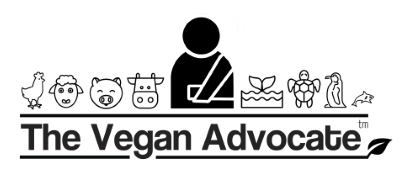The Choline Media Scandal
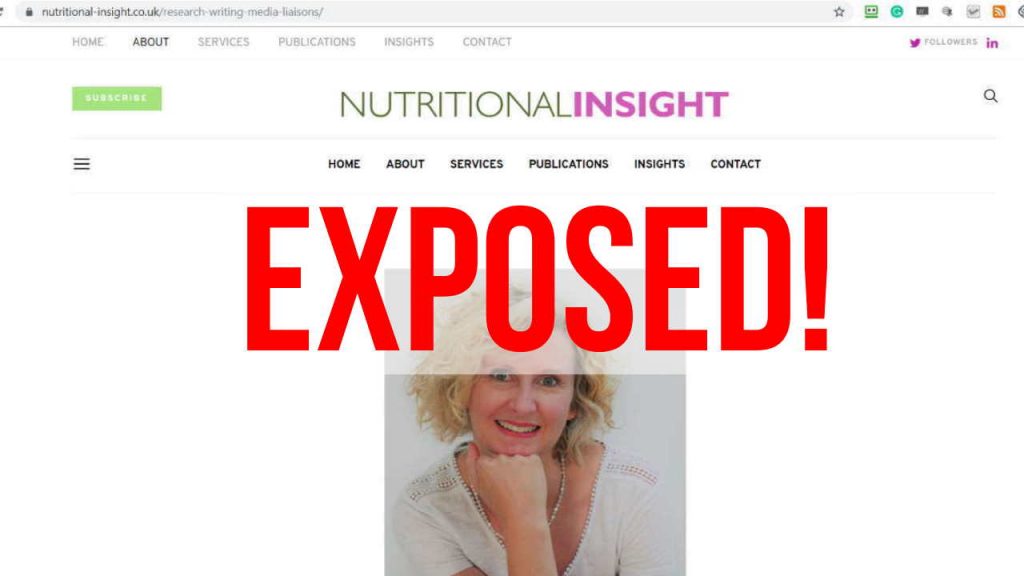
Today, Friday 30th August 2019 media sources reported on a new health warning aimed at vegans and anyone thinking of adopting a plant-based diet: take heed fellow vegans, according to the reports, our brains could be rotting from lack of one essential nutrient – choline!
Suddenly the only diet that has ever been shown to reverse the biggest killer of our times – Coronary Heart Disease (CHD), the same diet that has been shown to reverse type 2 diabetes, protect and lower the risk against virtually every type cancer, and the only diet that has reversed Multiple Sclerosis as well as prevent Alzheimer’s disease is, according the national media outlets, going to rot our brains! Really?
Let’s take a look at the evidence…pay attention though as we’re about to uncover yet another blatant case of misinformation attacking Veganism and discover how organisations with vested interests are pushing a self-serving agenda to deliberately mislead the public, causing fear and confusion in an attempt to halt the decline of animal agriculture and the growth of veganism.
The Story Unfolds…
Here’s how the story unfolded: an item came up on my newsfeed late last night, and by this morning it was being promulgated by various national mainstream media outlets.
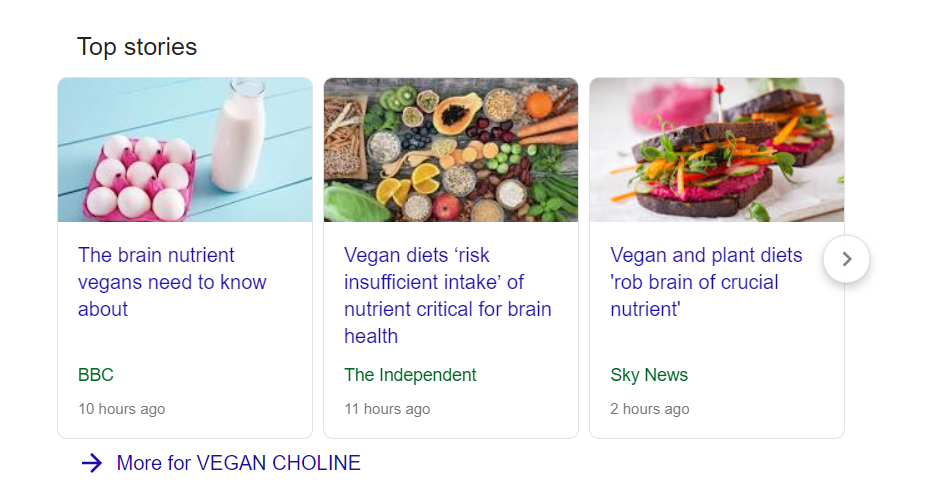
The BBC Health Editor, Caroline Parkinson, led with a headline: The brain nutrient vegans need to know about in an article that went on to claim that a vegan diet could be deficient in choline, a nutrient that is vital for a healthy brain.
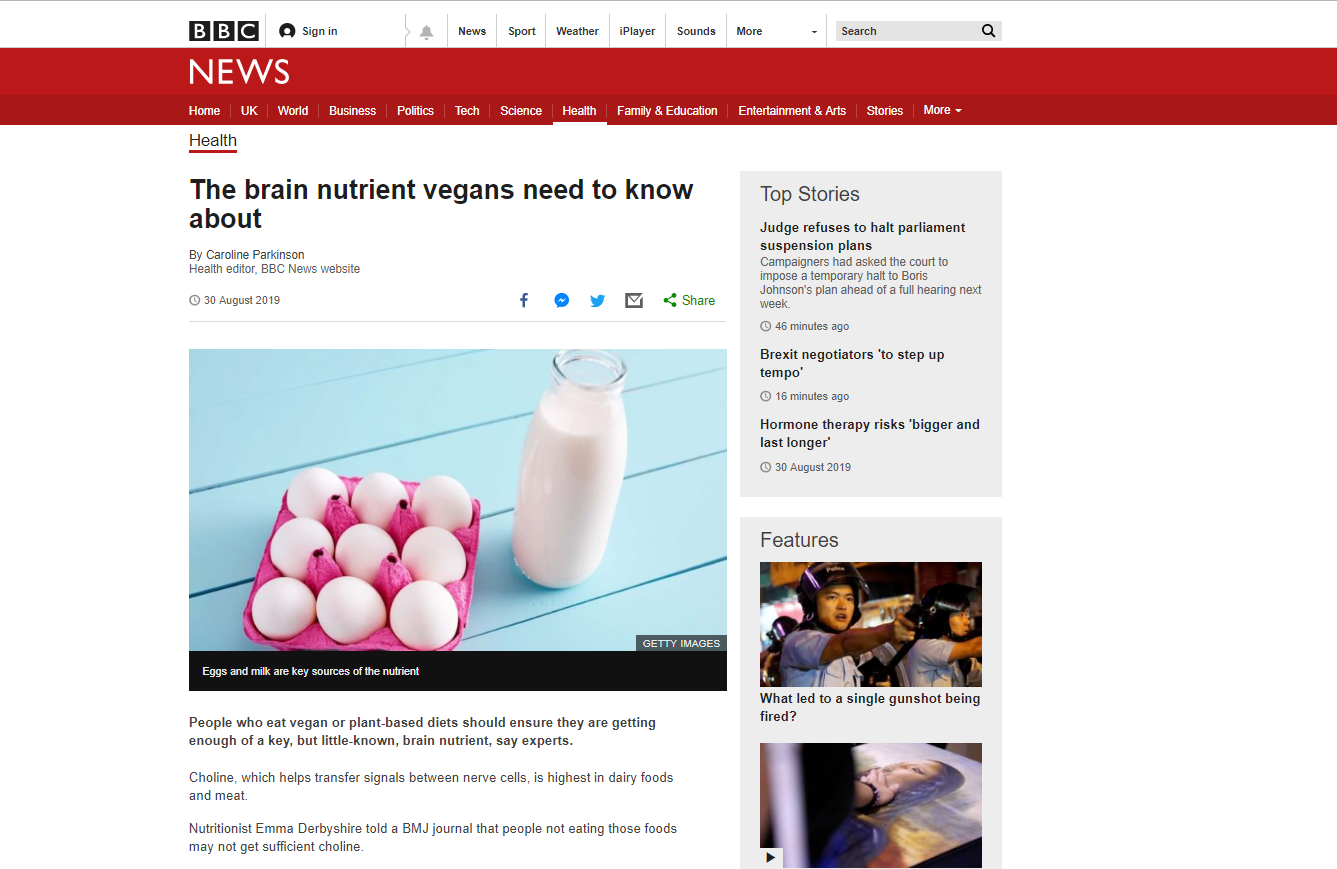
Gemma Crew, a health writer at The Independent, jumped on the bandwagon, with an article entitled: Vegan diets ‘risk insufficient intake’ of nutrient critical for brain health.
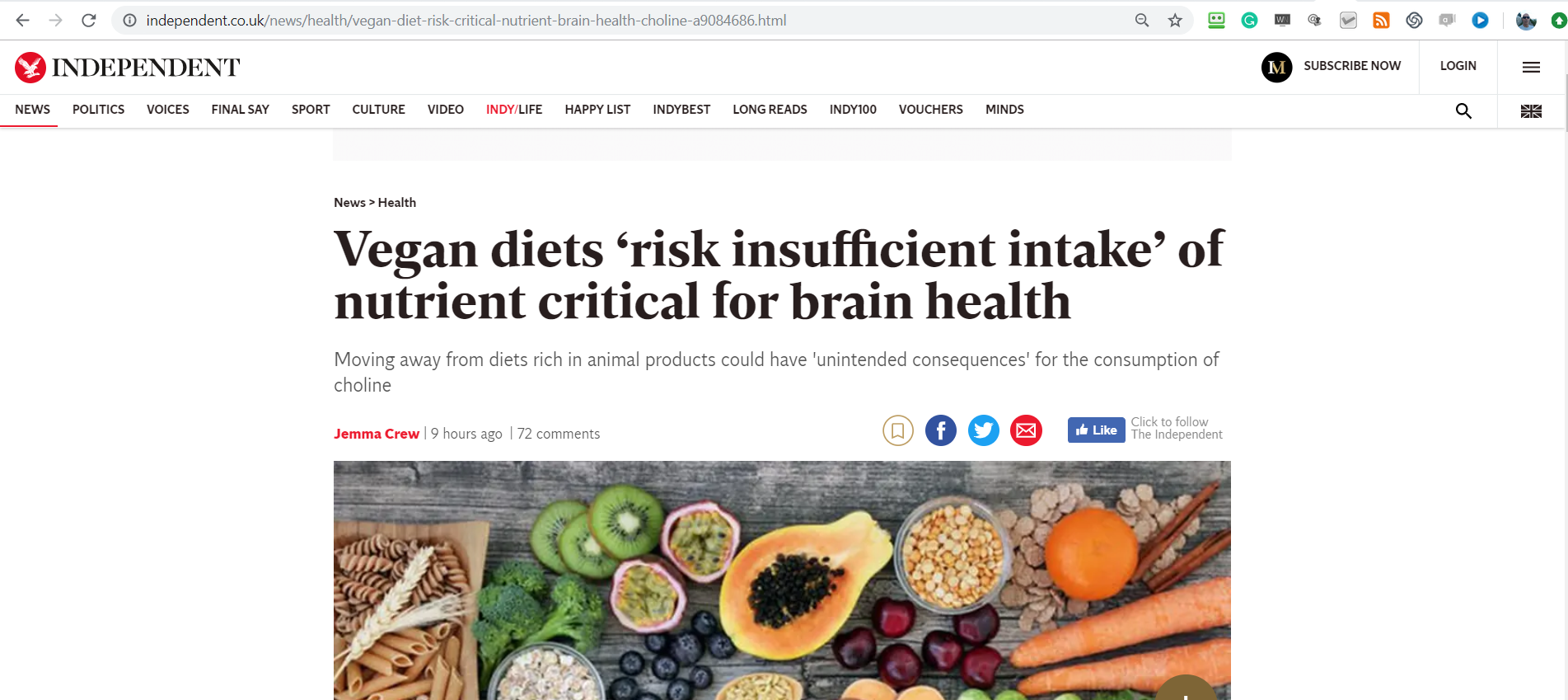
Then came the most outrageous, blatantly false, alarmist headline was posted on SKY News which claimed that vegan and plant-based diets ‘rob brain of crucial nutrient’:
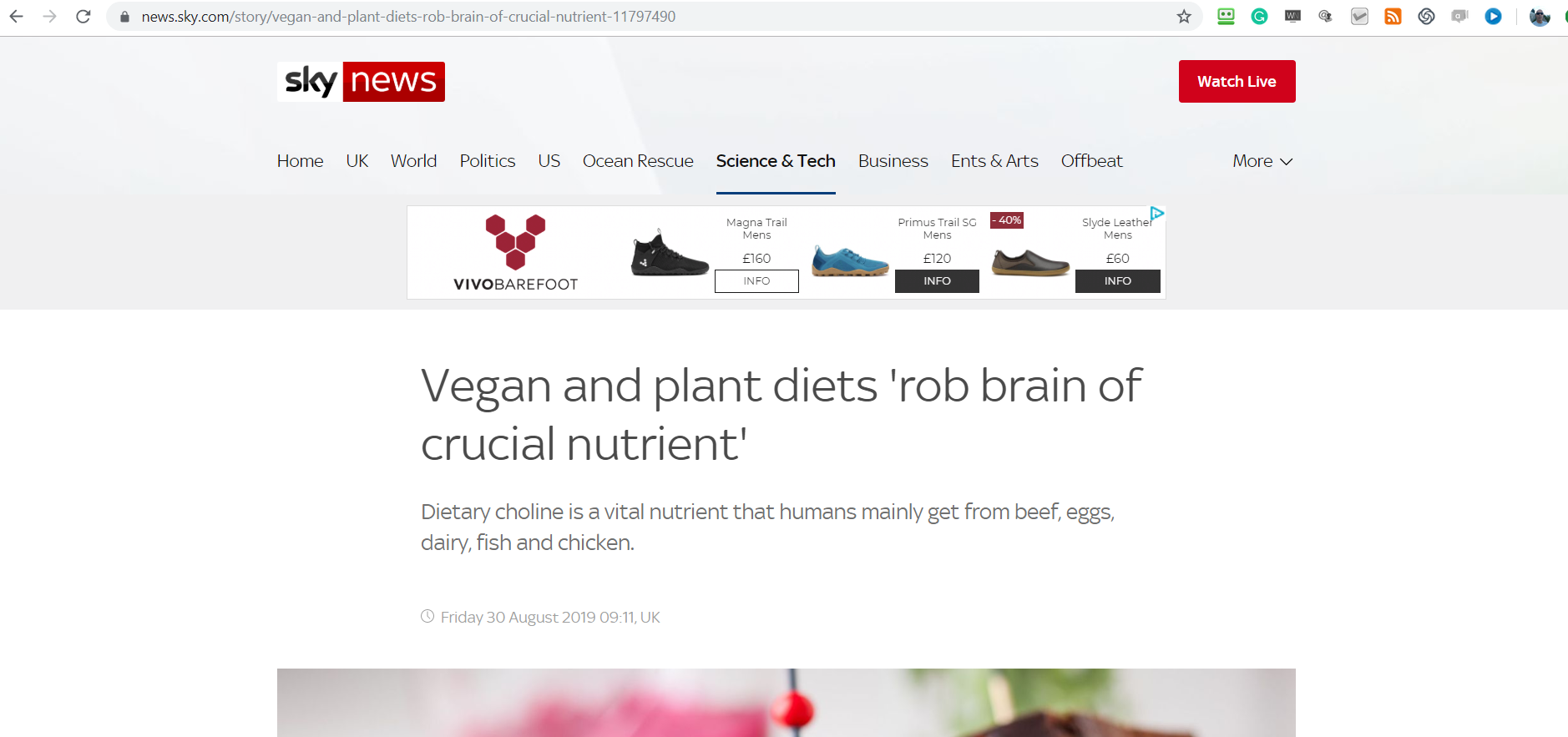
Notice that no editor/journalist put their name to the SKY News article. Perhaps this is understandable because the headline, as I will reveal in the course of this article is, at best, reflective of lazy ‘hack’ journalism (the product of bored, disinterested writers who think that journalism requires no more than the ability to re-write a press release without bothering to check the facts) and, at worst, collusion in the deceitful practice of spreading fallacious information on behalf of organisations with vested interests. A practice more commonly called spreading ‘Fake News’.
So, why are vegan brains going to rot?
Why are our vegan brains about to rot? And what is the terrifying evidence that has eluded all nutritional researchers until now that should make vegans and anyone thinking of adopting a plant-based diet consider the error of their ways before their brains turn to mush?
It turns out that the story is NOT, as the media would have us believe, based upon any study that shows vegans have defective brains. No, all of the health editors and journalists got their information from a Press Release about an article written by Dr Emma Derbyshire in the British Medical Journal. In the Press Release entitled ‘Suggested move to plant-based diets risks worsening brain health nutrient deficiency’ Dr Derbyshire claims that the UK is “failing to recommend or monitor dietary levels of choline”. The first paragraph tells the story:
‘The momentum behind a move to plant-based and vegan diets for the good of the
planet is commendable, but risks worsening an already low intake of an essential
nutrient involved in brain health, warns a nutritionist in the online journal BMJ
Nutrition, Prevention & Health.’
Dr Derbyshire thinks that people eating a plant-based diet, particularly if they are women of childbearing age, may not be getting sufficient choline in their diet and “should look at supplements”. What does she base her argument on? The fact that plants contain lower amounts of choline that, say, eggs and some meats. However, there’s a lot more going on here than a casual reader might suspect. This is nothing short of a scandal, and I’ll explain why.
Let’s first take a look at the claims by way of reviewing the evidence:
The warning to Vegans
Let’s get one thing clear; both the British Dietetic Association and The American Dietetic Association (the largest body of nutritionists in the world) have both acknowledged that a vegan diet is perfectly adequate to support all stages of human life. As far back as 2009, the Journal of the American Dietetic Association published a report concluding that:
“It is the position of the American Dietetic Association that appropriately planned vegetarian diets, including total vegetarian or vegan diets, are healthful, nutritionally adequate, and may provide health benefits in the prevention and treatment of certain diseases. Well-planned vegetarian diets are appropriate for individuals during all stages of the life cycle, including pregnancy, lactation, infancy, childhood, and adolescence, and for athletes.”
So why are we now being sold this claim that vegans brains are rotting due to lack of choline?
Choline – the evidence.
Nobody would dispute that choline is an essential nutrient; scientists have discovered that choline serves a number of metabolic processes in the body. All plant and animal cells need choline to preserve their structural integrity. The human body needs choline to synthesize phospholipids including phosphatidylcholine and sphingomyelin which are vital for cell membranes. In addition, choline is needed to produce acetylcholine, an important neurotransmitter for memory, mood, muscle control, and other brain and nervous system functions. Choline also plays important roles in modulating gene expression, cell membrane signalling, lipid transport and metabolism, and early brain development. But how much choline do we need?
Choline and how we get it
According to the Institute of Medicine (US), the AI for adults is 550 mg/day of choline for men and 425 mg/day. These levels are easily accommodated by a wholefood plant-based diet although it is true that eggs and some meats are very high in choline.
Reviewing the choline food table (below) from the National Institutes of Health, published in the Journal of Nutrition we can see the amount of choline present in common foods and, as we can see – but for some strange reason Dr Emma Derbyshire can’t – there are lots of plant-based sources.
| Food | Milligrams (mg) per serving |
Percent DV* |
|---|---|---|
| Beef liver, pan fried, 3 ounces | 356 | 65 |
| Egg, hard boiled, 1 large egg | 147 | 27 |
| Beef top round, separable lean only, braised, 3 ounces | 117 | 21 |
| Soybeans, roasted, ½ cup | 107 | 19 |
| Chicken breast, roasted, 3 ounces | 72 | 13 |
| Beef, ground, 93% lean meat, broiled, 3 ounces | 72 | 13 |
| Fish, cod, Atlantic, cooked, dry heat, 3 ounces | 71 | 13 |
| Mushrooms, shiitake, cooked, ½ cup pieces | 58 | 11 |
| Potatoes, red, baked, flesh and skin, 1 large potato | 57 | 10 |
| Wheat germ, toasted, 1 ounce | 51 | 9 |
| Beans, kidney, canned, ½ cup | 45 | 8 |
| Quinoa, cooked, 1 cup | 43 | 8 |
| Milk, 1% fat, 1 cup | 43 | 8 |
| Yogurt, vanilla, nonfat, 1 cup | 38 | 7 |
| Brussels sprouts, boiled, ½ cup | 32 | 6 |
| Broccoli, chopped, boiled, drained, ½ cup | 31 | 6 |
| Cottage cheese, nonfat, 1 cup | 26 | 5 |
| Fish, tuna, white, canned in water, drained in solids, 3 ounces | 25 | 5 |
| Peanuts, dry roasted, ¼ cup | 24 | 4 |
| Cauliflower, 1” pieces, boiled, drained, ½ cup | 24 | 4 |
| Peas, green, boiled, ½ cup | 24 | 4 |
| Sunflower seeds, oil roasted, ¼ cup | 19 | 3 |
| Rice, brown, long-grain, cooked, 1 cup | 19 | 3 |
| Bread, pita, whole wheat, 1 large (6½ inch diameter) | 17 | 3 |
| Cabbage, boiled, ½ cup | 15 | 3 |
| Tangerine (mandarin orange), sections, ½ cup | 10 | 2 |
| Beans, snap, raw, ½ cup | 8 | 1 |
| Kiwifruit, raw, ½ cup sliced | 7 | 1 |
| Carrots, raw, chopped, ½ cup | 6 | 1 |
| Apples, raw, with skin, quartered or chopped, ½ cup | 2 | 0 |
Yes, it is true that beef, chicken liver and, in particular, eggs show the highest total choline concentration (mg/100 g) : beef liver (418), chicken liver (290), eggs (251), there are many plant-based foods that contain choline in generous amounts that are more than sufficient for human health. A cup of soy milk alone provides 57mg and a cup of chopped broccoli contains 62mg, half a cup of roasted soya beans contains 107mg, and a half-cup serving of tofu contains 35mg. And, of course, most nuts, grains and vegetables contain choline in varying amounts.
Interestingly, BBC Health Editor Caroline Parkinson believes that we need to eat more dairy food to increase choline intake yet if you drank a pint of skimmed milk, ate a pot of yoghurt and a serving of cottage cheese, you’d still get less choline that you’d get from consuming half a cup of roasted soybeans!
The real danger of choline to human health
Whilst choline is an important nutrient for normal body functioning, but – and it is a BIG but – like virtually everything in life, consuming excess is harmful. More than harmful, choline can high amounts is toxic! The real danger to human health is NOT that we don’t get enough; it is that many people, particularly infants and children, might be consuming dangerously high amounts of choline. Peer-reviewed studies have shown that consuming high levels of choline may be extremely hazardous to human health.
Researchers have identified ‘upper levels’ or limits of choline consumption. Consuming higher amounts of choline is not just unhealthy, it is potentially dangerous. Excess choline leads to an increased risk of chronic disease and is associated with an array of unpleasant side-effects. This is because our gut bacteria can turn choline into the toxic by-product known as Trimethylamine oxide (aka TMAO) which is then absorbed back into our system.
Within less than thirty minutes of consuming excess choline, TMAO registers in the blood leading to spikes of inflammation in the body. High TMAO levels are associated with a significantly higher risk of heart disease, heart attack, stroke, or death… and all these symptoms have been shown to manifest within a period of just three years!
Higher choline levels in the blood have also been linked to a greater risk of getting prostate cancer. Eggs are particularly high in choline which may explain why other studies have found that egg consumption leads to a 70%-81% increased risk of lethal prostate cancer. Men who consume just 2.5 or more eggs per week (less than half an egg/day) had an 81% increased risk of lethal prostate cancer.
It is clear that many people (especially young children) are likely to be ingesting far too much choline from a standard meat-based diet. A single egg contains 147mg and a small 3oz of beef contains a whopping 356mg. Yet, the Adequate Intake of choline for children ranges from 125mg/day (infant) to 375mg/day (children aged 13 years) which means that a single 3oz beef burger takes a child over the Adequate Intake of choline.
Remember that anything over than the Adequate Intake levels is excess and when we consume quantities of choline beyond the ‘upper intake’ levels, we may be putting our health is at serious risk.
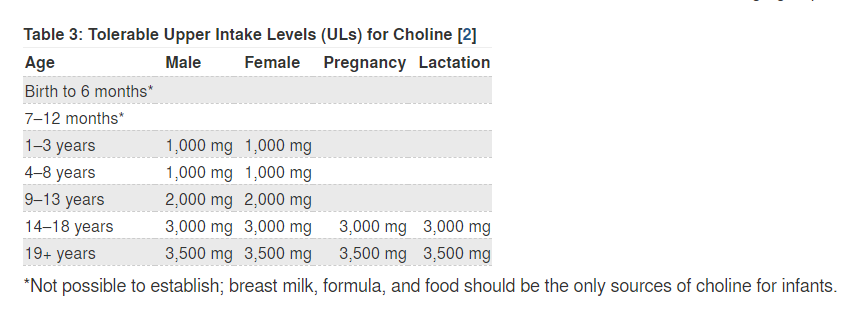
For these reasons, the real focus of any story on choline and human health should focus on the dangers of consuming excess choline because it is very apparent that people consuming a standard Western diet rich in meat and eggs may be consuming dangerously high amounts of choline in their diet.
So, what might be motivating Dr Derbyshire to ignore the toxicity relating to excess choline and instead raise an alarm for a potential lack of choline? Why is she trying to push vegans to take choline supplements?
Who is Dr Emma Derbyshire?
At this point, let’s ask questions of the person who instigated this whole choline ‘brain rot in vegans’ story – Dr Emma Derbyshire. And let’s see if we can find out what her motives might be in writing this ridiculously biased choline alarmist story?
Dr Derbyshire is a Director and Lead Consultant of Nutritional Insights Ltd, a healthcare consultancy that offers consultancy and article writing services to corporations who need help promoting their products. Essentially Nutritional Insights is a PR/Marketing service to corporations and organisations selling products and services in the health and wellness industry.
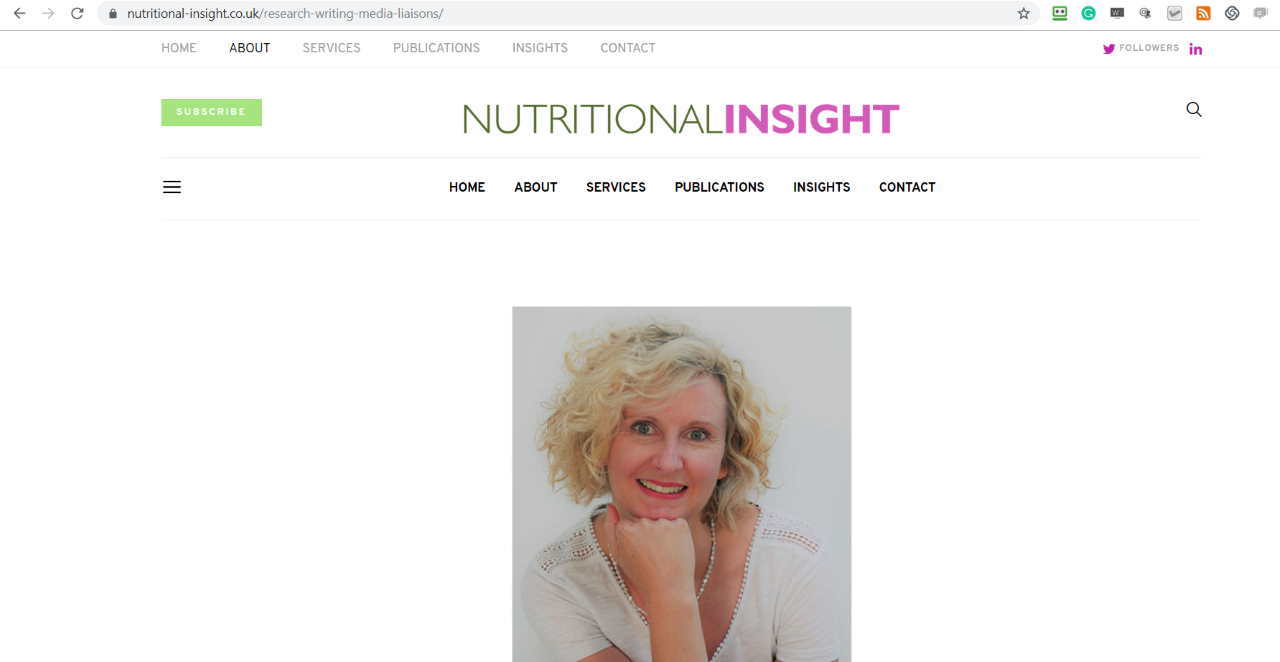
The company’s website openly admits that it “provides a range of offerings to clients to help them stand out to healthcare professionals and consumers scientifically.” Dr Derbyshire’s services are sold on the basis that she “has extensive consultancy experience compiling scientific documents for major international corporations, food and healthcare establishments, government agencies, eminent publishing houses and public relations agencies.”
In their offerings, Nutritional Insights proudly states that it has “experience to help compile thematic and compelling reports, research or publications to optimise their viewing rates and impact.”
And what organisations have the emminent Dr Derbyshire worked for?
Her clients include:
- The Meat Advisory Board – an organisation that promotes meat and claims to be ‘dedicated to providing everything you want to know about enjoying a healthy balanced diet and lifestyle’! Funny how they don’t mention how processed meat is classified by the World Health Organisation as a Group 1 carcinogen and that red meat is a Group 2 carcinogen. Any organisation that touts meat as part of a healthy diet is sham. Full of BS!
- The British Egg Information Service – A.K.A the egg industry’s marketing board – whose sole purpose is to convince the public how ‘good’ eggs are us despite the fact that the USDA has stated that eggs cannot be classified as nutritious, low fat, part of a balanced diet, low calorie, healthful, healthy, good for you, or even safe.
- The HSIS (the Health and Food Supplements Information Service). The HSIS may sound like an independent body but it is funded by the PAGB, and
- The consumer healthcare association which represents the manufacturers of branded OTC medicines, self-care medical devices and food supplements in the UK.
At this point, you’d have to be a deaf cattle rancher not to hear alarm bells! And those bells are not ringing about a lack of choline. No, the bells are sounding about something far more sinister. The selling of a meme that is not just misleading, but one that actually represents an inherent danger to public health.
Could it be a coincidence that a woman who consults and writes ‘compelling’ articles for corporations to ‘optimise their viewing rates and impact’ and works for a body that is funded by an organisation made up of corporations that sell supplements, is writing an article that recommends people “should look at supplements”? Or are we starting to see a foul network of bodies with vested interests trying to promote their own agendas in healthcare through alarmist misinformation? I’ll let you decide.
IMPORTANT NOTICE: Please refer to the medical disclaimer on this website. This site does not seek to offer any medical or healthcare advice. Any information is for informational purposes only. Readers are advised to seek the counsel of a qualified healthcare professional before making any changes to their diet or lifestyle.
I would recommend anyone who is concerned about their nutritional intake of choline or ANY nutritents – whatever your diet – to use cronometer.com. This is a free online service and enables you to check your nutritional needs and your daily intakes from the foods you eat. Of course, if you have any health problems, always seek the guidance of a health professional , although hopefully not one connected to a supplement organisation.
Sources:
BBC – The brain nutrient vegans need to know about.Caroline Parkinson.
Independent – Vegan diets ‘risk insufficient intake’ of nutrient critical for brain health. Gemma Crew
SKY News – Vegan and plant diets ‘rob brain of crucial nutrient’ – No associated editor/journalist –
Am J Clin Nutr. 2012 Oct;96(4):855-63. Epub 2012 Sep 5. Choline intake and risk of lethal prostate cancer: incidence and survival.
Richman EL1, Kenfield SA, Stampfer MJ, Giovannucci EL, Zeisel SH, Willett WC, Chan JM.
Concentrations of Choline-Containing Compounds and Betaine in Common Foods. Steven H. Zeisel, Mei-Heng Mar, Juliette C. Howe, Joanne M. Holden. The Journal of Nutrition, Volume 133, Issue 5, May 2003, Pages 1302–1307, https://doi.org/10.1093/jn/133.5.1302
Fact Sheet for Health Professionals: https://ods.od.nih.gov/factsheets/Choline-HealthProfessional/#h8
Dietary Reference Intakes for Thiamin, Riboflavin, Niacin, Vitamin B6, Folate, Vitamin B12, Pantothenic Acid, Biotin, and Choline. Institute of Medicine (US) Standing Committee on the Scientific Evaluation of Dietary Reference Intakes and its Panel on Folate, Other B Vitamins, and Choline.Washington (DC): National Academies Press (US); 1998.
American Dietetic Association – Vegan Diet: J Am Diet Assoc. 2009 Jul;109(7):1266-82.
Choline foods: https://lpi.oregonstate.edu/mic/other-nutrients/choline
Choline dangers: https://nutritionfacts.org/topics/choline/
